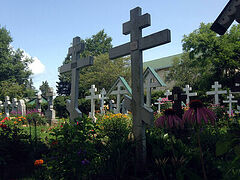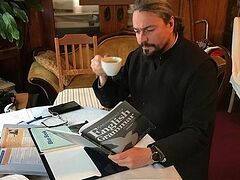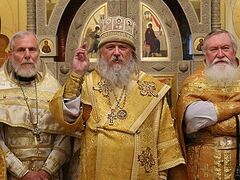Fr. Andrei moved to the USA during Perestroika. Today he is a senior lecturer at the legendary Holy Trinity Seminary in Jordanville and a researcher into the history of the Russian Church Outside Russia. We have talked with Deacon Andrei Psarev on COVID-19, the reasons behind The Black Lives Matter phenomenon, and the lessons of Church life.
—Jordanville is not only an educational theological establishment but, above all, it’s a monastery. How has the COVID-19 pandemic and the restrictions related to it affected the life of the monastery?
—My role at Jordanville is limited to teaching in the Seminary and the deaconate at the monastery. I suppose that the circumstances caused by the pandemic have shaken us up and shown us that we should remain Christians regardless of circumstances.
—By the by, regarding your teaching, or, to be more precise, your academic activity. You are known as a researcher of the history of ROCOR. Can you share some of the most significant discoveries made in the sphere in the recent years with readers? Is it important in Russia to know about the life of the Russian Church in emigration?
—I’d like to start with the book, The Legislation of the Russian Orthodox Church Abroad (1921—2007), that was published by St. Tikhon’s Orthodox University of Humanities in 2013. Its author is Dmitry Pavlovich Anashkin, my friend and colleague, professor of the Holy Trinity Seminary, who graduated in 1998 and died suddenly in 2018. He collected legislative acts of the Councils, Synods, and some diocesan bishops by subject. Since 2007 Andrei Alexandrovich Kostryukov, Associate Professor of St. Tikhon’s Orthodox University of Humanities and a Ph.D in History, has published three monographs on the history of ROCOR between 1921 and 1964. Currently, he is working on a new volume. St. Tikhon’s University is a leading research center for the study of the history of ROCOR. Unprecedented are the works on the studies of sources of the Russian Church Abroad by Andrei Vladimirovich Popov, a Master of History, Associate Professor of the Department of History and Organization of Archival Affairs of the Institute for History and Archives of the Russian State University for Humanities. Works of Alexander Valerievich Slesarev, Vice-Rector of Academic Work at the Minsk Theological Seminary and Academy, who conducts cutting-edge research of the Belarusian Catacomb Church and the diaspora, including those in ROCOR, Have recently become a discovery for me. Works of Hieromonk Nicodemus (Khmyrov), a Master of Theology at St. Petersburg Theological Academy, who in 2019 published the monograph, The ROCOR Tserkovnye Vedomosti Magazine (1922—1925), are very promising too. And these are just a few names of academic from the former USSR that are worth mentioning.
So researchers at home don’t need to be convinced of the need to study the history of ROCOR. Rather, today it should be done abroad, where the value of professional historical research and the need for an academic center of ROCOR in Jordanville are far from being obvious for many. Under these circumstances I am grateful to the Fund for Assistance to the Russian Orthodox Church Outside Russia, and the Otrada American-Russian Charity Aid Association, which support my website, “Historical Studies of the Russian Church Abroad (https://www.rocorstudies.org/).” Before the end of the year I hope to launch the site’s new version that above all aims to convey the value of historical methodology to a foreign reader.
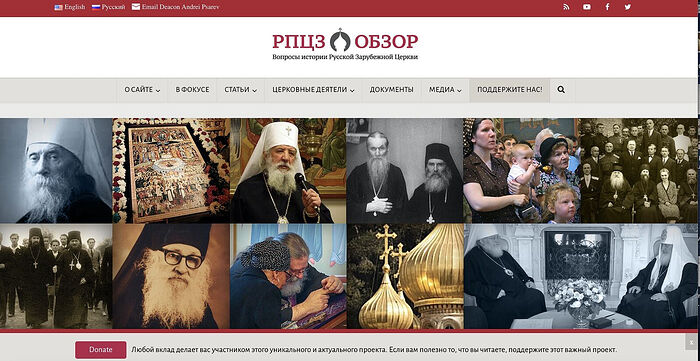 Fr. Andrei’s website, launched in 2008 and dedicated to the past and the present of ROCOR
Fr. Andrei’s website, launched in 2008 and dedicated to the past and the present of ROCOR
August 2021 will mark the 100th anniversary of the adoption of the decision by the Serbian Church Synod to protect Russian refugee bishops canonically. In connection with this I hope to hold an international conference in November 2021 in Serbia: “The Link of Times: Results and Prospects. For the Centenary of the Russian Church Outside Russia.”
—Over the years of your research you have surely accumulated enough facts about the life of the Russian Church Abroad. What amazed you the most and what left an indelible impression? Who are the emigration figures you truly became filled with love and respect for after finding out the facts about them that had been previously unknown?
—The selfless ministry of the numerous pastors of the Russian Church in the emigration has taken shape in a kind of iconographic image of ministry as expressed in the Russian saying, “for the sake of Christ Jesus and not for a bite of bread.” This was so vividly expressed by Archpriest George Benigsen, who during World War II served in the Pskov Orthodox Mission and after the war served in the ROCOR, and then in the OCA:
“Wherever we had been, we left last, doing our work to the bitter end with unfailing resolve, in the knowledge that our cause was that of the triumph of Christ… We went with the people, yet again leaving our native lands, leaving behind victims who fell under the bullets of partisans and Gestapo agents alike or who resolved not to leave or could not leave in time. We went Westward, knowing that we could not expect any mercy from the Bolsheviks, knowing the Soviet régime just as well as the German one this time around. We often heard our hearts saying: stay here, share in the fate of those who have taken up the cross of martyrdom, who are suffering for Christ in exile and concentration camps in the boundless expanses of Siberia. But yet another voice was calling us Westward, saying that that’s not all there is, and that they know the truth in the West. It will be able to stand up for the truth1.”
1991 marked the twentieth anniversary of repose of Archbishop Leonty (Filippovich) of Chile. As the editor of the Pravoslavnaya Rus’ magazine I was attracted by his personality as a bishop of the Catacomb Church in Russia that wasn’t in communion with deputy Patriarchal Locum Tenens, Metroplitan Sergei (Stragorodsky). That interest was reflected in my bachelor’s thesis, which, I hope, will come out someday in an expanded and revised form. In the course of my study the historical reality turned out to be different from what had been imagined. It emerged that while Fr. Leonty, who later became Vladyka Leonty, was in Russia, he was in communion with the Moscow Patriarchate.
Furthermore, having joined ROCOR in 1944, he began to struggle against the influences of “Renovationism and modernism.” This example demonstrates how far from our stereotypes real history can be.
—Which parishes of the Russian Orthodox Church Abroad can be called the keepers of the traditions of the past and of the Russian Empire today? Have many families of émigré descendants and their individual representatives managed to maintain continuity? In other words, my question is about the communities and people in them that can be called “the hidden Rus’” in Europe, America, Australia…
—While working during the season of salmon fishing in Alaska I met with some Bespopovtsy (a “priestless” denomination of Old Believers) and noted their high level of the command of Russian. In our environment, assimilation happens faster. Perhaps in Australia the original Russian culture is preserved better than anywhere else in the foreign countries. In Manchuria, Inner Mongolia, strongholds of Russian cultural life continued to exist till the 1960s when the last emigres from China moved to Australia. Like Old Believers, Russian emigres from “the three rivers’ region” have retained their dialect and peculiar expressions.
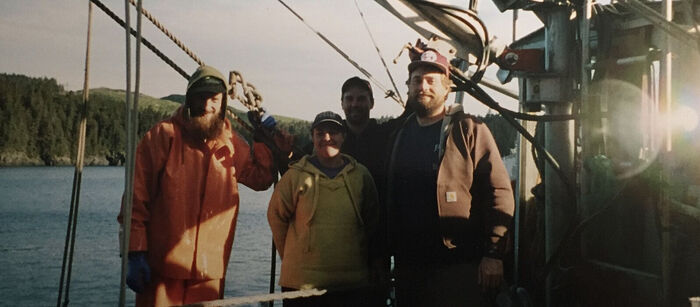 Making some money in Alaska. 2000
Making some money in Alaska. 2000
Fragments of the old upbringing and self-awareness can be found in all parts of the Russian Church diaspora. I believe that in the environment of descendants of the first emigres who didn’t recognize the restoration of Church unity in 2007, building the identity that opposes White Russia to “Sovok” [literally “a scoop”: a derogatory term in Russian slang meaning the Soviet Union, period, people, ideas or mentality.—Trans.] takes a special place. A vivid exponent of this mood is the Nasha Strana (“Our Country”) electronic newspaper.
Of the ROCOR parishes that mainly consist of descendants of White emigres I should mention St. Seraphim of Sarov Church at Long Island, NY, where the rector is Archpriest Seraphim Gan (who graduated from our Seminary in 1996), a connoisseur of the Russian Church musical and liturgical tradition.
—Do you follow the life of the Moscow Patriarchate? Which events of the recent years can be characterized as the most significant in Church life? What provoked your personal genuine interest in what was happening in Church life in Russia?
—The reunion of the Patriarchate with the Archdiocese of Russian Orthodox churches in Western Europe made a very good impression on me. Something that upsets me is the prolonged Ukrainian Church crisis.
—You are a member of the Committee on Church Law of the Inter-Council Presence. Can you tell readers about its activity and the most topical questions discussed by the Committee members lately?
—In addition to the Holy Scriptures, Church law of the Orthodox Church is based on the body of canons which includes rules that appeared in the Roman Empire between the third and the ninth centuries. Of course, this material needs to be adapted to modern reality and the rules that remain the most relevant need to be highlighted. The Committee on Church Law continues working on the Statutes on the Punishment of Clergymen. According to Metropolitan Clement of Kaluga and Borovsk, the appearance of such a document will not only define the main offences but also protect clergy from arbitrary treatment that takes place in the absence of modern regulations. In this sense, the document, “On Blessing Orthodox Christians for the Performance of Their Military Duties”, prepared by the Committee, has clarified the situation that it is unacceptable to consecrate non-personal military weapons and weapons of mass destruction. The Chairman of our Committee is Metropolitan Mark of Berlin and Germany. Perhaps we are the most international Committee with Russian, German, Latvian, U.S. and Estonian citizens among its members. For me the participation in the Inter-Council Presence in general and the Committee on Church Law in particular is always a cause for great joy: a new experience, a meeting with my colleagues, mental and spiritual food.
—I can’t refrain from asking you as an American citizen about the chaos caused in American society by adepts of the Black Lives Matter movement. Why has it happened? How serious will changes in the socio-political landscape of the country be and how can it affect the life of Orthodox in America?
—I think it helps us focus not on the symptoms, but on the disease itself. Why is the social unrest taking place? The BLM movement may have an agenda, but it has become an expression of the pain of the black population of the USA and of those who are not indifferent to injustice. To my mind, we won’t learn a lesson from this year’s events unless we begin to try and understand someone else, his pain and history, unless we want to leave our comfort zone.
A strong yet weak aspect of American society is individualism. Thanks to the freedom of speech guaranteed by the U.S. Constitution ROCOR has been able for decades to openly speak up on the issues in American society. We live in a secular country where the principles of social conduct are like those in an apartment building: We have rights, but we are encouraged to respect the rights of those whose lifestyle doesn’t suit us. I am of the opinion that changes in the socio-political landscape will continue with regard to the protection of the rights and civil liberties of various social and racial communities and increased secularization in the legal and cultural field. At the same time, we should keep in mind that no matter how modern Western society declares its secularity, it is imbued with Christian values. Suffice it to point out that the podvig of serving people, selflessness and mercy occupy a very high place in the scale of values of a modern Western intellectual.
—What is the main lesson you have learned over the years of your Church ministry?
—Perhaps it will be a lesson about the unproductiveness of various fears, that you should do all in your power to solve practical issues while trying to express your position for the benefit of the cause regardless of how popular it will be. If we see an unproductive situation that affects us and at the same time are afraid to start a conversation about it, we shouldn’t blame anyone other than ourselves that we continue to be in circumstances that leave much to be desired.
—The final question: what words from the Holy Scriptures inspire you or support you in difficult times?
—Though I speak with the tongues of men and of angels, and have not charity, I am become as sounding brass, or a tinkling cymbal. And though I have the gift of prophecy, and understand all mysteries, and all knowledge; and though I have all faith, so that I could remove mountains, and have not charity, I am nothing. And though I bestow all my goods to feed the poor, and though I give my body to be burned, and have not charity, it profiteth me nothing. Charity suffereth long, and is kind; charity envieth not; charity vaunteth not itself, is not puffed up, Doth not behave itself unseemly, seeketh not her own, is not easily provoked, thinketh no evil; Rejoiceth not in iniquity, but rejoiceth in the truth; Beareth all things, believeth all things, hopeth all things, endureth all things. Charity never faileth: but whether there be prophecies, they shall fail; whether there be tongues, they shall cease; whether there be knowledge, it shall vanish away. For we know in part, and we prophesy in part. But when that which is perfect is come, then that which is in part shall be done away. When I was a child, I spake as a child, I understood as a child, I thought as a child: but when I became a man, I put away childish things. For now we see through a glass, darkly; but then face to face: now I know in part; but then shall I know even as also I am known. And now abideth faith, hope, charity, these three; but the greatest of these is charity (1 Cor. 13:1-13).


